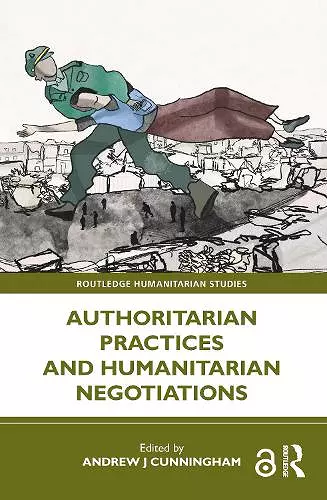Authoritarian Practices and Humanitarian Negotiations
Format:Paperback
Publisher:Taylor & Francis Ltd
Published:7th Dec '23
Currently unavailable, and unfortunately no date known when it will be back
This paperback is available in another edition too:
- Hardback£145.00(9781032327570)

This book examines authoritarian practices in relation to humanitarian negotiations. Utilising a wide variety of perspectives and examining a range of contexts, the book considers how humanitarians assess and engage with authoritarian practices and negotiate access to populations in danger.
Chapters provide insights at the macro, meso, and micro levels through case studies on the international and domestic legal and political framing of humanitarian contexts (Xinjiang, Afghanistan, Venezuela, Russia, and Syria), as well as the actual practice of negotiating with authoritarian regimes (Ethiopia). A theoretical grounding is provided through chapters elaborating on the ethics and trust-building dimensions of humanitarian negotiations, and an overview chapter provides a theoretical framework through which to analyse humanitarian negotiations against the backdrop of different types of authoritarian practices.
This book provides a wide-ranging view which broadens the frame of reference when considering how humanitarians view and engage with authoritarian practices. The objective is to both put these contexts into conceptual order and provide a firm theoretical basis for understanding the politics of humanitarian negotiations in such difficult contexts. This book is useful for those studying international politics and humanitarian studies, as well as for practitioners seeking to better systematise their humanitarian negotiations.
Chapters 1, 6 and 8: Commentary of this book is freely available as a downloadable Open Access PDF at http://www.taylorfrancis.com under a Creative Commons Attribution-Non Commercial-No Derivatives (CC-BY-NC-ND) 4.0 license.
This book unravels one of the most understudied and under-theorised aspect of humanitarian studies, namely the complexities of humanitarianism in the context of controlling – authoritarian – states. This poses many challenges where humanitarian organisations must adapt the theories defining their relationship with states and fine-tune their engagement strategies. This volume not only provides superior real-life analysis of state–aid relations, it also brings many pointers for humanitarians to improve how they negotiate humanitarian access with states.
Dorothea Hilhorst, Professor of Humanitarian Studies at the International Institute for Social Studies of Erasmus University in The Hague
Delivering vital aid to crisis-affected people often hinges on complex humanitarian negotiations within authoritarian environments. By combining concrete operational examples with political theory, Cunningham et al. offer a deeper understanding and sharper analytical lens for aid practitioners and scholars grappling with these issues.
Abby Stoddard, PhD, author of Necessary Risks: Professional Humanitarianism and Violence against Aid Workers
Charged with urgently saving in extremis, international humanitarian actors are often criticised as ‘state avoiding’ as they so often substitute, and undermine, state responsibilities. Yet, the reality is that the very presence, access and actions of aid actors in any country is predicated on challenging negotiations with often difficult authorities. This book offers an extraordinary insight into state-INGO negotiations to access communities at risk in some of the world's most hard-to-reach contexts: Afghanistan, Ethiopia, China, Russia and Syria. Pairing insights from international experts with critical insights from academics, this book spans conceptual theory, real-world experience and ethical dilemmas in some of the toughest places. It's a must read for practitioners, policy makers and academics working on humanitarian action today.
Sorcha O'Callaghan, Director, Humanitarian Policy Group, ODI
This book is designed to help humanitarian workers who are active in authoritarian states as they navigate ethical dilemmas, negotiate amidst uncertainty and make difficult choices on behalf of those they serve. Its case studies will be especially valued.
Sir David Nabarro, Strategic Director 4SD Foundation, Geneva Switzerland
ISBN: 9781032326795
Dimensions: unknown
Weight: 453g
254 pages